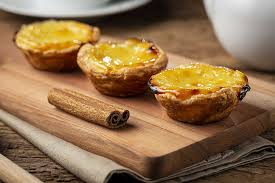How Portugal’s pastel de nata became Brussels favourite pastry

Lisbon: There’s soft power and there’s sweet power. An initiative launched last year is spreading fast in Brussels and beyond after being backed by EU officials and European integration enthusiasts.
Some might have tried them after watching Poor Things, where the main character played by Emma Stone appeared to be particularly fond of them.
Some others knew pastel de nata already, as this Portuguese delicacy is nowadays widespread all across Europe – and, perhaps surprisingly, in Asia too.
There’s something though, that links this unique egg-custard tart to a milestone in the EU’s integration process which turned pastel de nata into THE food symbol for Europe Day earlier this month.
Europe Day marks the anniversary of the historic 1950 Schuman Declaration where founding father Robert Schuman set out the idea of a new form of political cooperation in the continent at the root of the modern idea of the EU.
Europe Day is still not strongly felt by all EU citizens and recent attempts to revamp it included a European Parliament’s suggestion in 2022 to fix 9 May as the European Election Day regardless of the day of the week on which it falls or to make it a public holiday everywhere in the EU.
“Europe will not be made all at once, or according to a single plan. It will be built through concrete achievements which first create a de facto solidarity,” the Schuman Declaration reads.
Some believe that cultural aspects must be taken into account as steps forward in the integration process. And this is where pastel de nata enters the scene.
Indeed, a recent initiative looks at celebrating Europe Day with this particular foodstuff. But why so?
“This pastry was created by monks in a monastery in Belem, in the Lisbon area. Centuries later in the same monastery, the treaty of Lisbon was signed,” explained Pedro Lourtie, Portugal’s ambassador at the country’s permanent representation to the EU in Brussels.
In 1837, the secret recipe of pasteis de nata was sold by monks to a sugar refinery nearby which was turned into a ‘fabrica’, a bakery specialised in the production of tarts.
In the same halls where EU leaders signed the important merge of the Rome and the Maastricht treaties, Hieronymites monks perfected the recipe of the world-famous tart pastry called ‘pastel de nata’ – which was sold to a closeby ‘fabrica’, a bakery still open today, when the monastery was closed in 1834.
“So the pastel de nata holds a special place in Europe’s history,” the ambassador added.
The initiative was launched in Brussels last year and took hold with the hashtag #PastEUs on social media, where people shared this particular way of celebrating Europe Day.
For many, enjoying a good pastel de nata on Europe Day has become the sweetest way to celebrate the integration process which, warts and all, has brought peace and prosperity to a war-torn continent.
“I warmly welcome the initiative and, indeed, I can think of no better way to celebrate Europe Day than by embracing and enjoying the produce of our land,” the EU Agriculture Commissioner Janusz Wojciechowski told Euronews.
“So on Europe Day, let us celebrate the unique and uniting qualities of our tastes and traditions: from the pierogi of Poland to the pasteis de nata of Portugal, each carries a story and creates a memory, in where they come from and how they bring us together,” he added.
The Polish Commissioner also pointed out that our food and drinks, produced with care by our farmers and food workers every day, are the essence of the European Union as they embody the depth and diversity of our cultures and cuisines.





